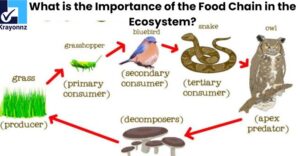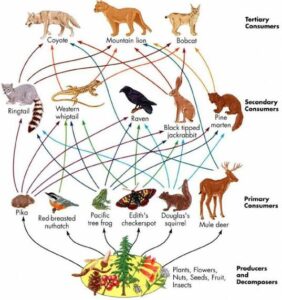Back to: ZOOLOGY 100 Level
It’s fantastic to see you back, ready to explore another exciting topic! Today, we’re going to dive into the world of food chains and the economy, and learn how living organisms, including plants and animals, are crucial in both nature and human life. Let’s see how they play their part in the bigger picture, from the food we eat to the economy of the entire world!
Importance in food chains and economy
Importance in Food Chains
In nature, everything is connected, and the food chain is one of the most important ways that life is linked together. A food chain shows how energy and nutrients are passed from one organism to another in an ecosystem. It starts with the smallest organisms and works its way up to the biggest predators. Let’s look at how it works:

- Producers (Plants): The food chain starts with producers, which are usually plants. These plants use energy from the sun to make their own food through a process called photosynthesis. They form the base of the food chain because they provide energy for the rest of the chain.
- Consumers: Next, we have consumers, which are animals that eat other organisms to get their energy. There are different types of consumers:
- Primary Consumers (Herbivores): These are animals that eat plants, like cows, goats, and grasshoppers. They are the first level of consumers.
- Secondary Consumers (Carnivores or Omnivores): These animals eat other animals. Examples include lions, snakes, and humans who eat both plants and animals.
- Tertiary Consumers (Top Predators): These are the animals at the top of the food chain. They have no natural predators and are usually large carnivores, like eagles or crocodiles.
- Decomposers: After animals die, decomposers like fungi, bacteria, and earthworms break down their bodies, returning nutrients to the soil so new plants can grow and start the cycle again.
Role in the Economy
Now, let’s shift to how organisms—both plant and animal—are important in the economy. In simple terms, the economy is all about how we produce, distribute, and consume goods and services. Organisms, especially those in the food chain, are vital for human livelihoods in many ways:

- Agriculture: Plants and animals are the backbone of agriculture. Farmers grow crops (like cassava, yam, and maize) and raise animals (like chickens, goats, and cows) for food. These are the primary products that feed people and are sold in markets.
- Fishing Industry: Fish and other aquatic animals, which are part of the food chain in oceans, rivers, and lakes, provide food and jobs for millions. Fish farming, also known as aquaculture, is a growing industry in many African countries.
- Tourism and Wildlife: Animals at the top of the food chain, like lions, elephants, and giraffes, are major attractions for tourism. Eco-tourism brings in a lot of money, and the economy of countries like Kenya and South Africa benefits from visitors coming to see wildlife in their natural habitats.
- Natural Resources: Plants, trees, and animals help maintain natural ecosystems that provide resources such as wood, herbs for medicine, and even materials for clothing, building, and tools. These resources contribute significantly to the economy.
Summary
- Food chains show how energy and nutrients flow from producers to consumers and decomposers in nature.
- Producers (plants) start the chain, followed by herbivores, carnivores, and decomposers.
- Organisms play a major role in the economy, from agriculture to fishing and tourism.
- Plants, animals, and ecosystems provide food, jobs, and resources that sustain human life and the economy.
Evaluation
- What are the different types of consumers in a food chain?
- Why are plants important in the food chain?
- How does fishing contribute to the economy?
- Name one way animals in the food chain help boost tourism.
You’ve done amazing work today, connecting the dots between nature and the economy. You now understand the importance of organisms not only in the environment but also in the world’s economy. Keep up the great work, and remember—every new lesson takes you one step closer to understanding the world around you!
